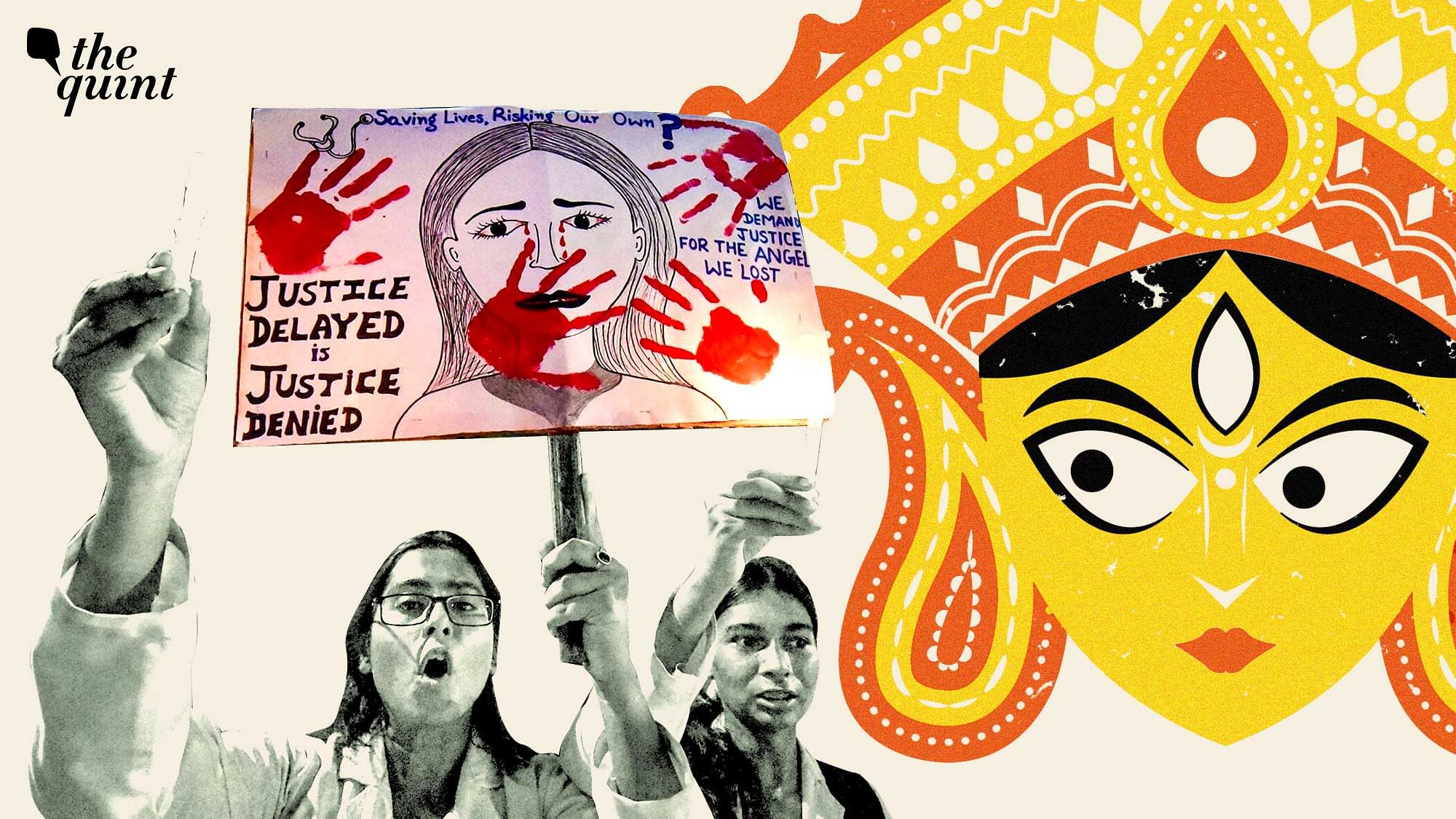Loud Protests, Silent Pandals: Durga Puja in Kolkata Isn't the Same This Year
This is unlike any pujo I've seen. Though the situation has left us uneasy, the demand for justice is far from over.

advertisement
“This year pujo is completely different. I believe light will never find its way to my house. My Durga has been already immersed, but justice for my Durga is still pending."
This is what the mother of the 31-year-old post-graduate trainee doctor, who was allegedly raped and murdered at RG Kar Medical College and Hospital in August, told Anandabazar Patrika on 2 October.
As Kolkata welcomes Goddess Durga, the absence of joy and excitement among Bengalis is palpable. WhatsApp groups with friends and families that usually buzz annually around this time of the year were deafeningly silent. Strangers on daily commutes commented on how most businesses dependent on the annual festivity were suffering losses – and how most would refrain from grand celebrations.
Local content creators on social media after posting the one token video on the rape-murder victim have moved on to create a list of must-visit pandals, but templates of “let’s not forget Abhaya” (Abhaya is what the victim has come to be known as) continue to be shared by thousands on the internet.
Although large crowds have been thronging to some of the most renowned pandals in the city, a sense of discomfort and despair is still finding a place in everyday conversations, be it amongst friends, families, or even strangers you've crossed paths with on an auto ride.
Most of my recent conversations with my Uber cab drivers have been about the current situation of the state – and how pujo cannot be used as a distraction this time.
With junior doctors calling for an indefinite hunger strike on 5 October at 8.30 pm due to the state government’s failure to address their demands, and the alleged child murder and rape case in Jaynagar, where the police have once again proved to be incompetent, a looming sadness has engulfed Bengal.
Women at the Forefront
Doctors aside, the brutal rape and murder of the trainee doctor left the entire nation in distress. It wasn't only the doctors who had taken to the streets; women of all age groups came together demanding the state ensure their safety, giving birth to the Reclaim the Night movement – a call for women to occupy the streets at night.
Amidst the recurring protests, incidents of groping and sexual harassment were being widely discussed on social media. The protests were not restricted to women, and while it was expected that the men who would come in support would ensure women’s safety, it was not the case.
These incidents, which are labelled insignificant or trivial in comparison to the impact of the movement, go on to show the deeply patriarchal mindset of Indian men who are, to an extent, intolerant of women in power.
Such incidents further demonstrate man’s need to establish dominance and express his rage rooted in the fear of women being, in all senses of the term, free.
The opposition parties are busy leveraging the incident for their political gain, while the state government has gone into a damage control mode after their massive failure in handling the case – perhaps, it is only the common people, women in particular, who are aware of the long battle ahead.
Either Goddesses or Fallen Women
As thousands of devotees bow their heads before the goddess of strength and power, one cannot help but be reminded that women continue to be dehumanised in their everyday lives.
There is a striking polarity in the way we are still perceived today – we are either goddesses or fallen women – but either way, we are stripped of our agency by suppression in the form of obedience or by force. Women, regardless of whether or not they comply with patriarchal standards, are reduced to objects of man’s desire.
Very recently, two youth wing leaders of the ruling Trinamool Congress in West Bengal were suspended for their attempt to tell Abhaya’s story through a short film, the poster of which had the doctor portrayed as a goddess.
If only the state government cared to look into medical infrastructure; if only a civic volunteer were not granted access and privilege beyond his job requirement; if only a repeated domestic violence offender were punished and not offered a job; if only there were surveillance cameras in the room; if only women's safety were an actual concern, there would have been no need to make a goddess of a woman.
The chaos on the streets of Bengal will not die down as easily – many have declared the protests a form of celebration of democracy and have decided to distance themselves from Durga Puja.
While discussing the situation with my friends and family, they expressed that they would refrain from celebrating even if they failed to participate in the protests.
Of course, that might not be the case for everyone, and at present the protests/strikes and pandal-hopping are going on parallelly in Bengal.
This is unlike any pujo I have ever witnessed in my city, and even though the situation has left some feeling uncomfortable, the demand for justice is far from over.
(Srijoni Rudra is a feature writer interested in telling stories that lie on the intersection of cinema, gender, and culture. She holds a master’s degree in film studies – and has spent two years teaching film studies at the GD Birla Centre of Education. This is an opinion piece, and the views expressed above are the author’s own. The Quint neither endorses nor is responsible for the same.)
- Access to all paywalled content on site
- Ad-free experience across The Quint
- Early previews of our Special Projects
Published: undefined